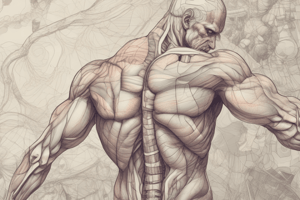Podcast
Questions and Answers
What is the primary feature of muscle degeneration?
What is the primary feature of muscle degeneration?
- Increased muscle mass
- Enhanced regenerative capacity
- Successful regeneration of all muscle fibers
- Progressive weakness affecting proximal muscles (correct)
Which type of mutation in the dystrophin gene is NOT typically associated with muscular degeneration?
Which type of mutation in the dystrophin gene is NOT typically associated with muscular degeneration?
- Translocations (correct)
- Deletions
- Duplications
- Point mutations
Which role does chronic inflammation play in muscle degeneration?
Which role does chronic inflammation play in muscle degeneration?
- It promotes muscle regeneration.
- It reduces the presence of macrophages.
- It exacerbates muscle loss and fibrosis. (correct)
- It has no impact on muscle fibers.
What is a common complication associated with muscular degeneration that affects the heart?
What is a common complication associated with muscular degeneration that affects the heart?
What diagnostic technique is best for confirming muscle degeneration and inflammatory changes?
What diagnostic technique is best for confirming muscle degeneration and inflammatory changes?
Flashcards are hidden until you start studying
Study Notes
Muscle Degeneration
- Progressive Weakness: Characterized by muscle degeneration and weakness, primarily affecting proximal muscles.
- Myofiber Damage: Necrosis of muscle fibers and replacement with fibrous and fatty tissue.
- Regenerative Capacity: Initially, muscle regeneration occurs, but eventually, the regenerative capacity is overwhelmed.
- Histological Findings: Increased connective tissue, fatty infiltration, and inflammatory cells in muscle biopsies.
Genetic Mutations
- Dystrophin Gene: Caused by mutations in the dystrophin gene located on X chromosome.
- Types of Mutations: Can include deletions, duplications, and point mutations.
- Function of Dystrophin: Dystrophin is crucial for maintaining muscle cell integrity during contraction.
- Inheritance Pattern: X-linked recessive inheritance; primarily affects males.
Inflammatory Response
- Inflammatory Cell Infiltration: Presence of macrophages and lymphocytes in affected muscle tissue.
- Cytokine Release: Inflammatory cytokines contribute to muscle damage and fibrosis.
- Role of Inflammation: Initially protective, but chronic inflammation exacerbates muscle loss and fibrosis.
Cardiac Involvement
- Cardiomyopathy: Common complication leading to dilated cardiomyopathy and heart failure.
- Electrocardiographic Changes: Abnormalities such as conduction defects or arrhythmias may be present.
- Management: Regular cardiac evaluation is essential; treatment may include ACE inhibitors and beta-blockers.
Diagnostic Techniques
- Clinical Evaluation: Observation of muscle weakness and functional impairment.
- Genetic Testing: Identification of mutations in the dystrophin gene through blood samples.
- Muscle Biopsy: Histological examination to confirm degeneration and inflammatory changes.
- Imaging Studies: MRI can assess muscle involvement and abnormalities.
- Electromyography (EMG): Used to evaluate muscle electrical activity and differentiate from other neuromuscular disorders.
Muscle Degeneration
- Progressive weakness primarily affects proximal muscles, leading to significant dysfunction.
- Myofiber damage includes necrosis of muscle fibers, replaced by fibrous and fatty tissues.
- Muscle regeneration occurs initially, but the capacity is eventually surpassed, leading to permanent damage.
- Histological findings reveal increased connective tissue, fatty infiltration, and inflammatory cells in muscle biopsies.
Genetic Mutations
- Mutations in the dystrophin gene, located on the X chromosome, are responsible for muscle degeneration.
- Types of mutations include deletions, duplications, and point mutations affecting gene function.
- Dystrophin plays a crucial role in maintaining muscle cell integrity during contraction cycles.
- The inheritance pattern is X-linked recessive, predominantly affecting males due to their single X chromosome.
Inflammatory Response
- Infiltration of inflammatory cells, including macrophages and lymphocytes, characterizes affected muscle tissue.
- Cytokines released during the inflammatory response contribute to muscle damage and promote fibrosis.
- While inflammation initially serves a protective role, chronic inflammation can worsen muscle loss and exacerbate fibrosis.
Cardiac Involvement
- Dilated cardiomyopathy is a common complication, increasing the risk of heart failure in affected individuals.
- Electrocardiographic changes may include conduction defects or various arrhythmias that need monitoring.
- Regular cardiac evaluations are essential; treatment options can involve ACE inhibitors and beta-blockers.
Diagnostic Techniques
- Clinical evaluation involves observing muscle weakness and functional impairments to assess severity.
- Genetic testing identifies mutations in the dystrophin gene using blood samples to guide diagnosis.
- Muscle biopsy provides histological confirmation of muscle degeneration and inflammatory changes.
- Imaging studies, particularly MRI, are effective in assessing muscle involvement and identifying abnormalities.
- Electromyography (EMG) evaluates muscle electrical activity, helping differentiate between various neuromuscular disorders.
Studying That Suits You
Use AI to generate personalized quizzes and flashcards to suit your learning preferences.



